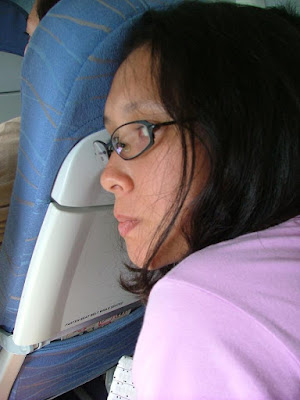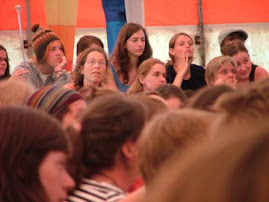It's crazy this Troubled Asset Rescue Plan of America. Some $700 billion is going to be used by the American government "to buy up mortage-backed securities whose values are so down that they've become impossible to sell."
Checkout New York Times for the complete story, or rather, stories. For Filipinos not quite in the loop of this piece of news, checkout opinion columnist Randy David's "Public Lives" in yesterday's (October 4) Philippine Daily Inquirer (PDI) on page A10.
One of the many things that Randy points out is the difference between American and Filipino spending. "Credit," he says, "is the lifeblood of the US economy. It is the only way Americans do business." He further writes that in everyday transactions, "hardly anyone pays with cash, except for the smallest purchases." I thought buying coffee is a small purchase but in America, according to Randy, even THAT is paid with a credit card. Filipinos, or any foreign tourist paying a $ US 100 bill for coffee will get stared at.
Randy writes that the difference between us (Filipinos) and them (Amercians) is that here we measure a person's worth by his/her family background, educational attainment, profession, connections, and visible wealth. But there, where there's less heirarchy, a person's worth is roughly equivalent to what s/he can borrow from a bank, or how much s/he can buy on credit. (Randy's US-based sisters and their husbands live in America.)

Before, somebody in America could only own a house if s/he had a steady and adequate income. But until recently, anyone in America could own a house - even those who earned too little to normally qualify for such loans. That's because banks had plenty of money that needed to make more money and so the banks gave out loans to almost anyone who wanted them as long as they paid interest later on. That was the agreement between the banks and the borrowers.
Since there was such a big demand for housing, everyone paying for a bank loan was reassured that what they were paying out was more than offset by the rising market value of their homes. The problem was that people were seduced with offers to borrow more money against the equity they already paid - in order to upgrade to a bigger home, buy a new car, or go on vacation.
One of the many things that Randy points out is the difference between American and Filipino spending. "Credit," he says, "is the lifeblood of the US economy. It is the only way Americans do business." He further writes that in everyday transactions, "hardly anyone pays with cash, except for the smallest purchases." I thought buying coffee is a small purchase but in America, according to Randy, even THAT is paid with a credit card. Filipinos, or any foreign tourist paying a $ US 100 bill for coffee will get stared at.
Randy writes that the difference between us (Filipinos) and them (Amercians) is that here we measure a person's worth by his/her family background, educational attainment, profession, connections, and visible wealth. But there, where there's less heirarchy, a person's worth is roughly equivalent to what s/he can borrow from a bank, or how much s/he can buy on credit. (Randy's US-based sisters and their husbands live in America.)
The point is, I'm getting there: credit cards and housing loans are the average American's great equalizer. So to speak.
Before, somebody in America could only own a house if s/he had a steady and adequate income. But until recently, anyone in America could own a house - even those who earned too little to normally qualify for such loans. That's because banks had plenty of money that needed to make more money and so the banks gave out loans to almost anyone who wanted them as long as they paid interest later on. That was the agreement between the banks and the borrowers.
Since there was such a big demand for housing, everyone paying for a bank loan was reassured that what they were paying out was more than offset by the rising market value of their homes. The problem was that people were seduced with offers to borrow more money against the equity they already paid - in order to upgrade to a bigger home, buy a new car, or go on vacation.
These offers were hard to pass by so many took it. They probably thought, so much debt accumulated and so much interest to be paid but so what? We can pay back in time!
Now look at the mess they got themselves into. People can't pay back! The interest rates have increased, people have been laid off, etcetera. Understandably, these circumstances have made it extremely hard for people to pay back their housing loans. So people have to give up their "loaned" houses. Not just a couple of houses but too many than the banks can handle.
This, my friends, is the reason why I shall never, ever get a credit card. On several occasions while walking in the malls, I have been offered a credit card but always I say no. Even two friends on separate occasions tried to give me a credit card. No thanks I always say. I have enough money, I don't need credit. Besides, I can see through the banks' motive of issuing unsolicited credit cards in order to spur credit spending. Count me out of this consumeristic culture driven by credit because I just don't like the feeling of having to pay utang for something i don't really need to buy in the first place. Live within your means. Pay in cash. Work hard then save harder in order to buy what you need.
I realize that's easy for me to say because of the circumstances I'm in - still living at home with ma and pa. There will probably come a time when I do need credit to buy something I need. As for now, I will continue relishing my financial uh, freedom, for as long as I can and continue a lifestyle that's uh, doable. I'm talking of ukay-ukay, mt biking and gymming, no car, no pork, and beef and junkfoods, no unnecessary things like clothes and bags and shoes I don't really wear anyway.
I've put everything in writing so that I won't eat my words.
I've put everything in writing so that I won't eat my words.























5 comments:
bitaw! hehe..
hahaha. baliktad lagi ta og sitwasyun? ako kay nag apply halos tanan banks for credit card bisan sa discouragement ni tsok og sa ako mama na dili ko mag credit card(kay gahi man jud kog utok as always hihihi). frustrated na kaayo ko kay wa juy nanawag or nag confirm man lang na rejected tung gipang applyan nako(sa mga credit card reps). may nalang jud wa kay namulubi na kog samot run. hihihi. tama jud ka maya. maigo jud ko anang imong gipang ingun ba. hahaha.
dili na jud mo mangambisyun og credit card! hahahaha! live what we can afford jud kay daghan kaayo ko kaila og kauban sa work na namroblema sa bayrunun because of habitual "swipe2x". sa una maibog ko. karun tama ra jud diay sila tsok og mama nako. hehehe
-al
that's great al! ayaw ka selos sa ila. i bet they can't sleep soundly at night.hehe :)
tsakto ra ang hambal mo, maya. kun pinsarun mo gani, nami pamatian ang tinaga nga "credit" pero ang translation na gali, "utang". sosyal bay kun english no? ako ga pati sa hambal nga, "mas mayad pa nga gamay lang ang imo savings o bisan wara pa, basta wara lang ti utang".
tama ka gid ronald! parehas ra ang credit kag utang. no difference at all!
Post a Comment